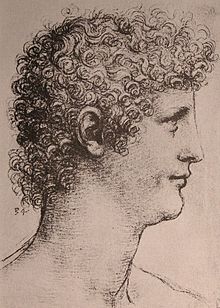Salaì
| Salaì | |
|---|---|

Drawing thought to be Salaì by Leonardo da Vinci
|
|
| Born |
Gian Giacomo Caprotti da Oreno 1480 Oreno, Vimercate, Italy |
| Died | 1524 (aged 43–44) Milan, Italy |
| Nationality | Italian |
| Notable work | Monna Vanna |
| Movement | High Renaissance |
| Spouse(s) | Bianca Coldiroli d’Annono |
| Patron(s) | Leonardo da Vinci |
Gian Giacomo Caprotti da Oreno, better known as Salaì ("The Devil", lit. "The little unclean one") (1480 – before 10 March 1524), was an Italian artist and pupil of Leonardo da Vinci from 1490 to 1518. Salaì entered Leonardo's household at the age of ten. He created paintings under the name of Andrea Salai. He was described as one of Leonardo's students and lifelong servant and is thought by some to be the model for Leonardo's St. John the Baptist and Bacchus.
Salaì was born in 1480 as son of Pietro di Giovanni, a tenant of Leonardo's vineyard near the Porta Vercellina, Milan. He joined Leonardo's household at the age of ten as an assistant. Vasari describes Salaì as "a graceful and beautiful youth with curly hair, in which Leonardo greatly delighted". Although Leonardo described him as "a liar, a thief, stubborn and a glutton" and he stole from Leonardo on at least five occasions, he kept him in his household for more than 25 years, in which he trained as an artist. Salaì became a capable, although not very impressive, painter, who created several works, including the Monna Vanna, a nude version of the Mona Lisa which may be based on a lost nude by Leonardo. Leonardo is thought to have used Salaì as the model for several of his works, specifically St. John the Baptist.
During Leonardo's second stay in Milan, he took another young pupil, Francesco Melzi. Unlike Salaì, Francesco was a son of a nobleman. When Leonardo traveled to Rome in 1513 and to France in 1516, Salaì and Melzi both accompanied him. As an adult, Melzi became secretary and main assistant of Leonardo, and undertook to prepare Leonardo's writings for publication. Vasari says that Melzi "at the time of Leonardo was a very beautiful and very much loved young man". In France, Francesco Melzi was greeted as "Italian gentleman living with master Leonardo" and granted donation of 400 ecus, while Salaì, already over 40 years old, was described as "servant" and granted a one time donation of 100 ecus. Salaì left Leonardo and France in 1518. He later returned to Milan to work on Leonardo's vineyard, previously worked by Salaì's father, which was granted to him by Leonardo's will.
...
Wikipedia
